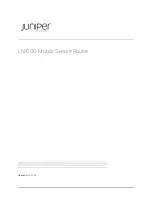
Introduction
83
Models 2603, 2621, and 2635 User Manual
8 • DHCP and DNS Configuration
Introduction
The routers offer a DHCP Server, DHCP Relay capability, and DNS Relay incorporated into the OnSite. Of
the two DHCP features, only one can be enabled at a time-either DHCP server or DHCP relay.
DNS relay can hold two DNS server IP addresses in memory so the DNS relay can forward DNS queries and
responses between the host user and the DNS server.
The DHCP Server will listen for DHCP client requests on a suitable IP interface. Typically this is the Ethernet
interface, named ip1 by default.
Note
The Ethernet LAN port can be configured as a DHCP client to receive its IP
address from a DHCP server on the Ethernet LAN. If so configured, you
should not enable the OnSite’s DHCP server on the Ethernet interface.
DHCP Relay functions transparently between a a DHCP client and a DHCP server. The DHCP relay appears
as a DHCP server to the DHCP client’s point of view. The relay operates by forwarding all broadcast client
request to known DHCP servers. The DHCP relay listens on all available interfaces. All relay-server communi-
cation is unicast. It is important that valid routes are set up to the server and also to the client.
Services and features normally associated with each other
The following table (
figure 4
) is to give guidance on what services of OnSite features to configure when you
have decided to use DHCP Server, DHCP Relay, or DNS Relay.
If you are configuring a feature listed in the first column (Configured Feature), you can determine which other
features either cannot be, must be, usually, can be, or are rarely used. The “Rarely used” column is listed to be
technically correct, but it is ill advised to use. The three most important columns (other than the first) are:
•
Cannot be used
•
Must be used
•
Usually used
Use the table like this: “The feature in this column [...] with the Configured Feature (in Column 1).”
For example:
1.
The feature
DHCP Relay
[column 2] cannot be used with
DHCP Server
[row 1, column 1]
.
2.
The feature
Routed
[column 4] usually is used with
DHCP Relay
[row 2, column 1].
















































